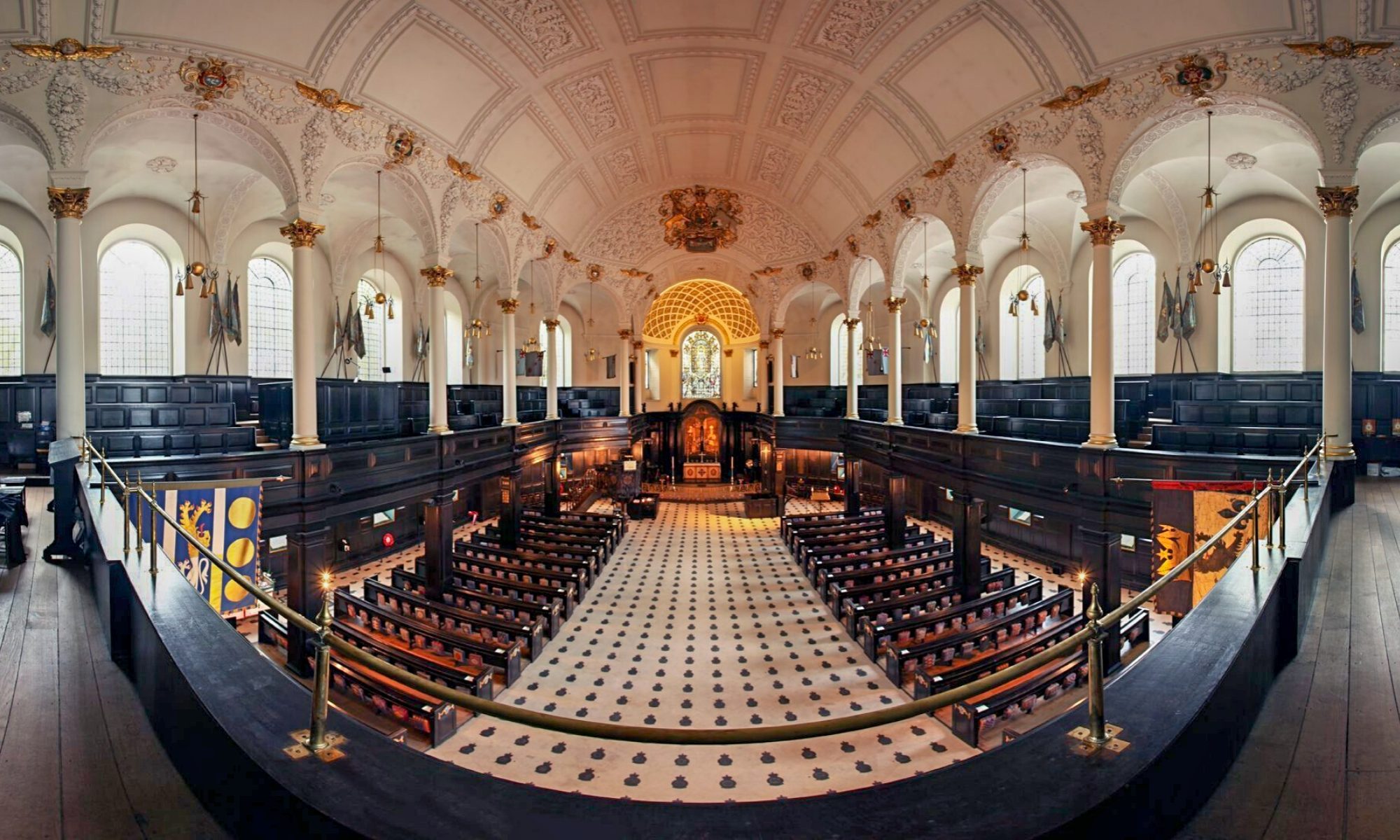Birth, Marriage, Immigration, and Death Records
Baptismal Record
Henry
Born 21 July 1642
Baptized 29 Step 1642
Father’s First Name William
Mother’s First Name Mary
Parish St. Clement Danes
County Middlesex
Country England
Archive City of Westminster Archives Centre
Record Set Westminster Baptisms
Category Birth, Marriage, & Death (Parish Registers)
Subcategory Parish Baptisms
Collections from England, Great Britain
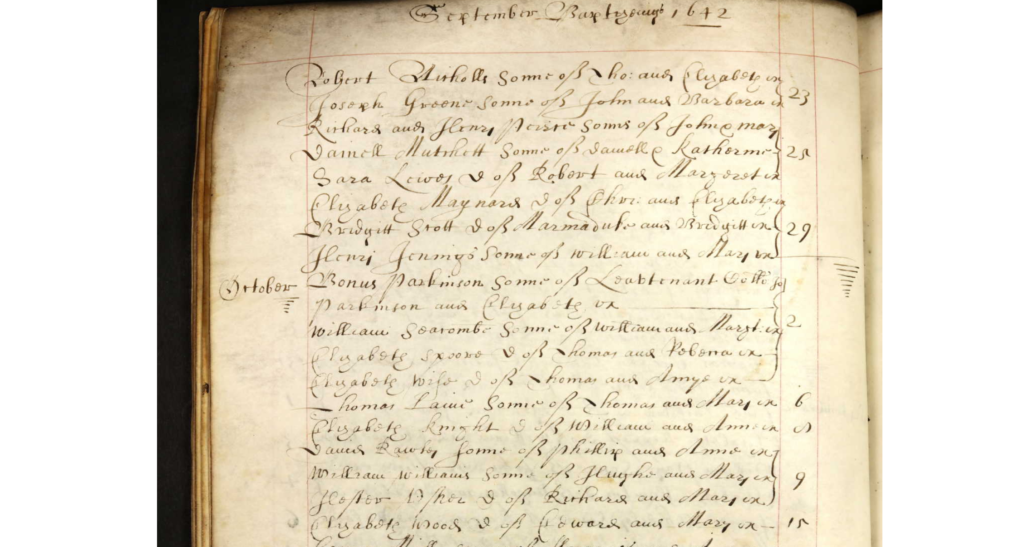
Marriage Record
Anne Godwin
Anne Godwin
Last name Jennings
Name note
Marriage year 1663
Marriage date 24 Feb 1663
Marriage place Westminster
Spouse’s first name(s) Anne
Spouse’s last name Godwin
Spouse’s age –
County Middlesex
Country England
Record set England Marriages 1538-1973
Category Birth, Marriage & Death (Parish Registers)
Subcategory Parish Marriages
Collections from England, Great Britain
Source: England Marriages 1538-1973 and FindMyPast.com
Child Records
Isaac
Isaac Jennings
No birth records
Mentioned in Margaret Busse Jennings Will as the “reputed children of her husband, Henry Jennings
Death or Will January 1759
Place Haddonfield, Camden, New Jersey, British Colonial AmericaI
Sarah
Sarah Jennings
No Birth Records
Mentioned in Margaret Busse Jennings Will as the “reputed children of her husband, Henry Jennings
Two Death Dates
Date: 11 February 1741
Place: Deptford, Gloucester, New Jersey, British America
Burial 8 December 1733
Place: Middletown Township, Bucks, Pennsylvania, United States
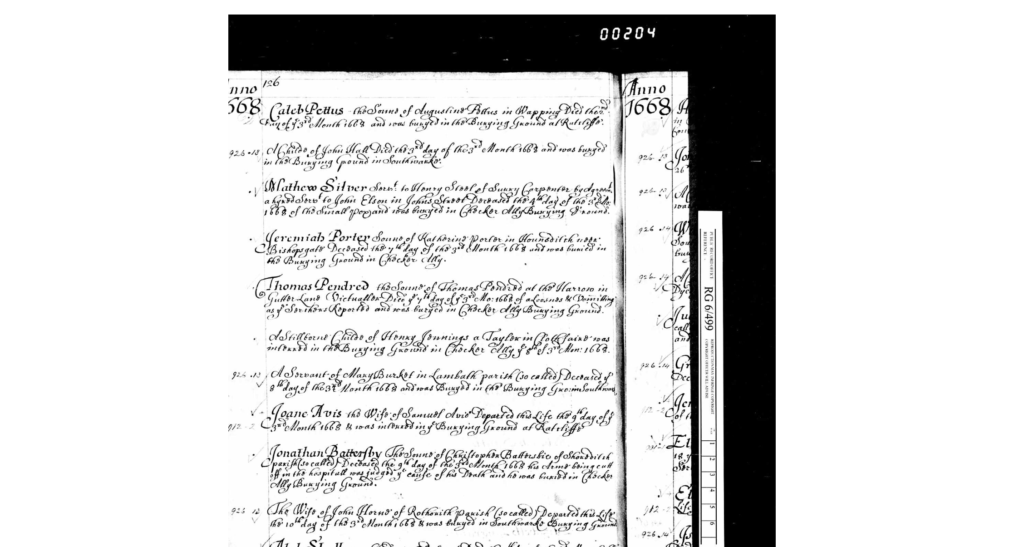
Marriage Record
Margaret Busse
First name(s) Henry
Last name Jennings
Marriage year 1666
Spouse’s first name(s) Margaret
Spouse’s last name Bussy
Place Society of Friends
County –
Country England
Source
Boyd’s 1st miscellaneous marriage index, 1415-1808
Record set England, Boyd’s Marriage Indexes, 1538-1850
Category Birth, Marriage & Death (Parish Registers)
Subcategory Parish Marriages
Collections from England, Great Britain
FindMyPast.com
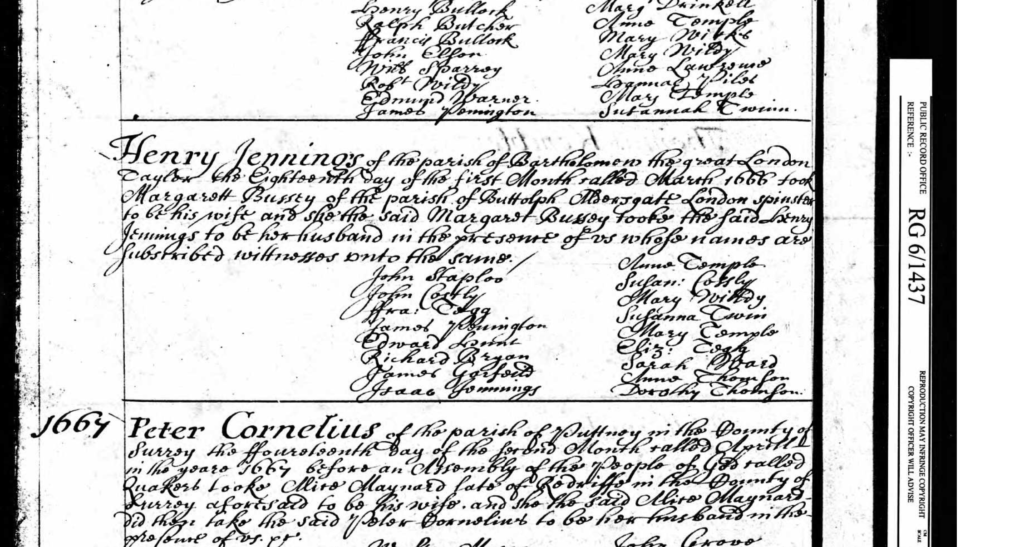
Child Records
Stillborn Child
Name A Stillborne Childe of Jennings
Event Type Burial
Father Henry Jennings
Death Date 1668
Burial Date 8 May 1668
Burial Place Checker Ally, England
Meeting Quarterly Meeting of London and Middlesex
Piece Description
Piece 0499: Quarterly Meeting of London and Middlesex: Burials (1661-1700)
Source England & Wales, Quaker Birth, Marriage, and Death Registers, 1578-1837 and Ancestry.com

Immigration Records
Transcript of Salem Friends Arrival Record
Salem Quaker Arrival Record
1677
Henry Jennings sonn of William Jennings and Mary his wife was born in the parish of Clementdean the 21 day of the 7 month 1642 as then the kingdom of the England in the county of Surry. After this the said Henry Jennings on the 18 day of the 3 month 1666 in London did take Margaret Busse to wife, the daughter of Paul Busse of York of then England and our last abode was in hamlet of Ditton neare Kingston on Thames, from there on 5 day of the second month of 1677 we’s transported our selves with our servant, 1 maid named by Martha Berkett, daughter of John Berkett mercer neares Kingston upon Thames for so as another good life yea in America on the ship called the Kent, Gregory Marlow being master and on the 23 day of the 6 month following arrived at Salem.
Note: Henry incorrectly reported the county of his birth as Surrey. St Clement Danes is in Middlesex England.
Source: Swarthmore College; Swarthmore, Pennsylvania; Births and Burials, 1686-1807; Collection: Philadelphia Yearly Meeting Minutes; Call Number: MR-Ph 365
Copy of Original Document

Transcription of letter from Henry Jennings to his brother Isaac 1689
1942 Transcription
As of the date of this letter, Henry would have been 47 years old and would have lived in west Jersey for 12 years.
Source: Worcestershire Record Office, England
Binyon, Spriggs and other Worcester families
Catalogue Ref. 705:938
Creator(s):
Binyon family of Worcester, Worcestershire
Spriggs family of Worcester, Worcestershire
ref. FILE [no title] – ref. 705:938/8720/1/ii/2-4 – date: 1689[90]
[from Scope and Content] From Henry Jennings of New West Jersey [U.S.A.], to his brother, Isaac Jennings of London. With transcription, 1942.
Addressed to:
For my Loving Brother Isaac Jennings in Sandwich Courts
in Devonshire Street
Nere Bishopsgate
London
1. Loving brother & sister my dears, love with my wife is remembered unto
2. unto you & your deare children hoping in ye Lord you are in good
3. health. Through ye Lords great mercy we are indeferenly (indifferently) well at this present
4. wrighting (writing) praises be unto ye Lord for our more hearing this suding (sudden)
5. opportunity[1] I can not inlarge (enlarge) at this time, received 3 letters from
6. you sence last somer. one with N. Ghoen (?) book & one from John
7. Tizark & one by ye way of Maraland. Jo; Tyzark[2] hath another for me,
8. which I have not perused becos I can not conveniently goe to him, but have
9. sent to him for it, but he is gone to Maraland – I have writ also to
10. William David[3] (?) in Pholedelphiah (Philadelphia) to goe to Will; Canter about ye mony (money)
11. and their answer is that they will not pay it until they heare whether
12. ye party that he ordered in England to pay thee hath paid it or no, wich (which)
13. I sopose (suppose) is but a – – — put of (off) for I can heare no good report of him,
14. but abell (able) anof (enough) but not willing without a grat (great) deal of troubell, so if thee
15. intend I must get it, thou must sent a letter of Aturny (attorney) & witnesses
16. before a publeck noterry (notary), or else it will not stand in court for I heare
17. he is a very shuffling troubsom man to deale with by those that knoweth
18.vhim very well. So deare heart time being short with me at this time, hearing
19.vthat Thomas Bud[4] is going for Ingland very spedely (speedily) & hearing that
20.vtimes is something troubilsom in Ingland[5], was willing to inform you
21.something of our outward present condition. We have 2 days before the
22. date hereof lett our plantation[6] & most of our stock for six yeares, & doth
23. intend to live in Salem & doe something of my hans (hands), for my wife & I
24. are grone (grown) very unabell to manidg (manage) a plantation. We have kept it som
25. years ye longer expecting your coming, but now we are out of that hope,
26. for we heard nothing of your coming in your letters wich makes us to
27. think you will not com. We should be very glad you chould give up
28. to send one or to of your children, that they may be our children, for
29. I hope we shall have anof for them & I dout (doubt) not that they will doe very
30. well heare & be a comfort to you & us while we live hearee for we are not
31. like to have any other. Send them by Thomas Bud when he returns back
32. againe for gladly would I see some of your faces & so would my wife Mal (Margaret).
33. Wibrokes is with us still, her time drawes pretty (pretty) near out; she worries a lot
34. from her father & mother that they would have her com to Ingland but
35. she saith she hath no mind to com to Ingland any more. She thrives & is very healthful
36. in this country. Martha Nare is dead. She died in child bed. Here
37. is a letter enclosed from her husband to her father Jo; Berkett. We
38. desiree thee to goe to our sister Clarabut & remember our dear loves
39. to her & to our Cozen Cole & his wife & children & inform them of us, as you
40.heare how it is with us, & tell them we should be glad to heare from them.
41.Remember our deare loves to our sister Ale & husband & to our sister
42.Mary Heilder, husband & children to our cozen An Goldman. No
43.more at present but our deare & tender love to you all & all our deare
44.friends & acquaintances that inquire after us, desiring your safie
45. and prosperity in that unchancabell (unchangeable) truth & power will out live
46.all fading delights in this world. I rest & remain your loving brother till death.
47.Henry Jennings
48. Monmuth river in new
49. ye 1 of ye 2 mo. 1689
50. 2. Mo. 1689
[1] “Sudden opportunity” probably means that Henry had just learned that Thomas Budd was about to leave for England, providing him the chance to send this letter to his brother.
[2] This could be John Tizak, identified as “Merchant of London” and Executor of the will of William Royden (frp, http://www.ancestorspy.com/PA/philwills.asp Will 120 . WILLS PROVED AT PHILADELPHIA, 1692-1697 From volume 1, starting at page 84. (Originally published in the Publications of the Genealogical Society of Pennsylvania, Volume II, June 1900.)
transcribed by Donna K. Clark (The spelling is as originally printed by the society.)
[3] A Wiliam David is identified as a landholder in Philadelphia ( PUBLICATIONS OF THE GENEALOGICAL SOCIETY OF PENNSYLVANIA Dec. 1898 Miscellany No. 2 Landholders of Philadelphia County, 1734 is identified as a landholder in Philadelphia (ftp://ftp.rootsweb.com/pub/usgenweb/pa/philadelphia/land/1734land.txt)
[4] There existed a “Thomas Budd” who was a contemporary of Henry and the first owner of Atlantic City and a Quaker. See http://www.rootsweb.com/~njatlant/documents/budd-thomas-atlanticcity.txt
[5] “Troublesome times” in England probably referred to the following (From http://www.entheology.org/library/winters/QUAKER.TXT) “When Oliver Cromwell took control of English government from 1654 to 1658, he permitted tolerance to all Christian sects–including Quakers– as long as they did not engage in sedition. (Indeed Cromwell, had several friendly religious discussions with George Fox.) After the restoration of the monarchy in 1660, special legislation was again enacted AGAINST the Quakers.”
[6] Henry’s Plantation might be the land he bought in 1681 from John Adams recorded in NJA Vol. 21 – Salem Deeds, No. 2 (1678-1688) “1681-2 March 12. Do. Same to Henry JENJNGS of New Salem, W. J., tailor, and wife Margrett, for 200 acres of the 1,500 a. tract, surveyed out of 2,000 acres, granted to said ADAMS and wife by John FENWICK March 15, 1674-5, near Jacob YOUNG’s plantation, on Chohazick River and Abrooke’s Creek. 5“
Death Records and Will
Death Record of Henry Jennings
Name Henry Jennings
Gender Male
Residence Date1705
Residence Place New Jersey, USA
Death Place Philadelphia
Will Date 27 Jun 1705
Probate Date 23 Apr 1706
Spouse Margaret
Household Members
Copy of Original Death Record
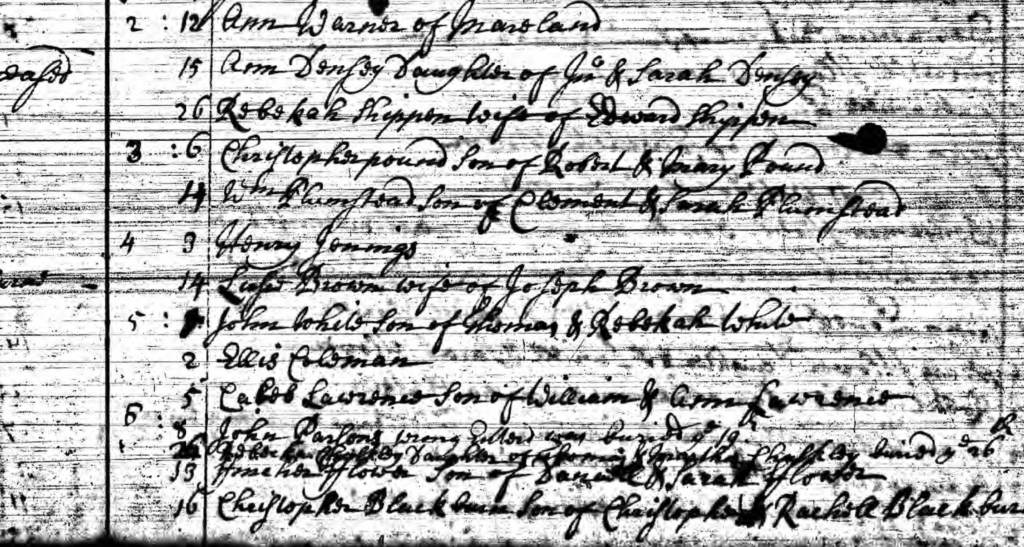
Swarthmore College, Pennsylvania Births and Records
Died April 3 1704 Source: Swarthmore College; Swarthmore, Pennsylvania; Births and Burials, 1686-1807; Collection: Philadelphia Yearly Meeting Minutes; Call Number: MR-Ph 365 and Ancestry.com
Will of Henry Jennings
Source: William Henry Jennings 1899
In the name of God Amen. I, Henry Jennings, of the city of Philadelphia the Province of Taylor, being of a sound mind and disposing memory and judgment, doe make & ordaine this my Last Will and Testament. PrinciplyI Commit my Soul to God who gave it and my body to the earth to be decently buried at the discretion of my Executrix hereafter named & my worldly estate I Dispose of as followeth Imprs. I will that all my just debts be paid by my Executrix. Next, I will Devise & bequeath to Isaac Jennings, to his heirs & Assigns forever the hundred and fifty Acres of Land that I bought of Thomas Graves. Item, I give Devise & bequeath the house and Lott where I now live to my cozen Margaret Jennings, daughter of Isaac Jennings of London, to her heirs & assigns forever, after the Decease of my wife.
Also, I give Devise & bequeath to my loving wife, Margaret Jennings, to her heirs & assigns forever all the Rest & Residue of my estate, both real & personall, both here and elsewhere not herein before bequeathed: & whome I doe hereby Nominate Constitute & ordaine to be my Sole Executrix of this my Last Will & Testament, Revoking and Expressly-annulling all former Last Wills & Testaments by me heretofore made, Declareing this alone to be my Last Will & Testament. IN WITNESS whereto & whereof I have put my hand & seale this 27 day of June 1705. Henry Jennings (his seal) Signed sealed published and declared in the presence of us William Hudson Theo. B. Beadford Thomas Paschall
Burlington ye 23d. April 1706 Personally appeared before me Thomas Revell Esq. Surrogate, Margaret Jennings Executrix of the within will & took her attestation to bring in a true Inventory & performe the will according to law Jurat Coramme. Thos. Revell Surr.
Edward viscount Cornbury Captain General & Governor in Chief in & over the Province of New Jersey New York & all the Territories & tracts of Land Depending thereon in America & Vice Admirall of the same &c. To all to whome these presents shall come or may concern Greetings Know Yee that at Burlington ye twenty third day of April Anno Dorn 1706 the last will & Testament of Henry Jennings was proved approved and allowed of by me whilst having lived and having at the time of his Death Goods, Chattels & Credits in Divers places within the Province by means whereof the full Disposition of all & Singular the said Goods Chattels &n Credits of the said Deceased & His Last Will & Testament in any manner of ways Concerning was granted unto Margaret Jennings Widdow & Executrix of the said Last Will & Testament names Chiefly of well & truly administering the same & and of making a true & perfect Inventory of all & singular the said Goods, Chattels & Creditts & exhibiting ye same into the Secretarys office of the said Privince at or before the 23d day May next ensueing & of rendering a just and true Acct. Calculation and Reconing when thereunto shee shall be Lawfully Required.
In TESTIMONY whereof I Thomas Revell Esqr Surrogate have hereunto sett hand and seale this 23d day of April Anno RRa Anna Quinto. Annoq Dom. 1706. Tho. Revell Surr. ”recorded in Liber I of Wills page 147 &c.
Miscellaneous Sources and Records
William Henry Jennings, 1899
Henry Jennings was a prominent member of the Salem Monthly meeting of Friends soon after its organization in 1666. He was the son of Williams and Mary Jennings, born the 21st of the 7th month., 1642, in the County of Surrey, England. Henry and his wife Margaret embarked for America in the ship Kent, Captain, Gregory, and landed at New Salem N.J. 3rof the 6th month., 1677.
There are many people in West New Jersey who are said to to be descended from Henry Jennings. This seems to me to be probable, and I shall therefore present such references to him as have appeared in official and historical records. (How could he have descendants if he had no children? See above.) (Ed.).The following I am told by a former Secretary of the “Jennens Association”, was certified to by Richard M. Acton, Custodian of Records of Salem Monthly Meeting, 8th Mo. 14, 1878.
Henry Jennings., son of William and Mary, was born 7th Mo.21, 1642, in the Parish of Clemonddeane, in the County of Surrey, England, married 1 No. 18, 1666, in London, Margaret, daughter of Paul Bussie, of York City, Old England. They left England for West New Jersey on the ship Kent 2 No.5, 1677, with their servant Martha, daughter of John Basse, arriving in Salem 6 Mo. 23,1677.
James Riley Jennings, 1967
It seems quite generally agreed that Henry Jennings was the foundation stock of the Haddonfield Jennings. He was the son of William and Mary Jennings and was born in Clemond-deane, Surrey, England, July 21, 1642. Henry and wife Margaret Bussie Jennings, came to America on the ship Kent, landing in Salem, N.J., 23rd, 6 mo. 1677. They left from their home in Kingston, on Thames, London, bringing with them their servant “Martha Berkett, in one report, and in another the name was Martha Bassett. Such a difference seems not unusual in the reports or records of the “Friends Monthly Meetings”. Handwriting, spelling and phraseology in original records of monthly meetings indicates frequent changes in the scribe or reporting secretary. Within a two-year period in the Salem the name Henry Jennings is spelled in the following manner: Henerie Jememes, Henerie Jemenes, Henry Jenyngs, Henry Jenings, and finally Henry Jennings.
There is also a conflict in the name of the Master of the Kent, the ship bringing them to the New World. Our grandfather, Henry Jennings, born in Waynesville, Ohio, Aug. 6th 1812, writing to the Sect. of the Jennings Association, April 17th, 1850, states: “We trace back from our father James Jennings, by a succession of wills and records, to Henry Jennings, our parent stock, came from England to the United States. And we find him on the Emigrants Register, the time of landing, the vessel he came on, and the name of the master of the vessel, & c.
He came on the ship Kent, Meeslow, master; landed 16 June, 1677.” All other records and documents so far seen, refer to Gregory, Master A question arises. Was the first or last name used in the records? Could the name have been Gregory Meeslow, or Marlow
Note: Notes: Gregory Marlow was master of the Kent
James Riley Jennings, 1967
One of the most comprehensive reports on the Jennings family was published by the above author in Vol. 11 entitled: The History of the Jennings Family in England and America. The volume contains approximately 600 pages and is found in many libraries across the land. Reference to this book be abbreviated in this report with the designation WHJ 1899.
In this volume we find that Henry his wife Margaret owned land in many parts of New Jersey. Some was purchased in Gloucester County and considerable near Cohansey (now Greenwich). In 1681 Henry purchased 200 acres from John In 1682, 200 acres were purchased from two Indians. In 1695 Jennings of River (sold) some acreage of the latter to John Bacon of Cesarea River. In 1687 Salem records. at Trenton indicate that Henry bought (350) acres from Roger Milton
Source: William Henry Jennings, Columbus, Ohio, 1899 (WHJ 1899)
Shrouds History of Fenwick Colony
P.119.
In 1682, John Adams, son-in-law of John Fenwick, sold Henry Jennings 200 acres of land. Henry likewise purchased a considerable tract of land in Cohansey precinct., it being near the town of Cohansey, (Now Greenwich). Henry and his wife removed from Salem and located in the City of Philadelphia, about the year 1700, and at that place ended their days. He was a tailor by trade and followed it in that city. He died in1706., and made his will the year previous. Not having any children he devised most of his estate to his uncle, Isaac Jennings, of London and to the daughter of Isaac, Margaret Jennings, his cousin
Excerpts, History of New Jersey, John Barber 1844
John Fenwick came to America from England in 1675, on the ship Griffith, landing in a spot he named Salem, soon to become known as West New Jersey. He immediately began forming what later was called FENWICK’S COLONY. This was the first ship from England to land in the area. It was followed in less than two years by the ship Kent, among whose passengers was Henry Jennings, of London. The passengers on both ships were, for the most part Friends or Quakers. Negotiations were soon under way for the purchase of large tracts of land. By circumstance, William Penn, among others, was appointed trustee to handle large land holdings. A constitution or government was soon agreed upon by the colonists and was entitled:
“THE CONCESSIONS AND AGREEMENTS OF THE PROPRIETORS, FREEHOLDERS AND INHABITANTS OF THE PROVINCE OF WEST NEW JERSEY”.
There were one hundred and forty-five signers of the document, among whom were William Penn and Henry Jennings.
Large tracts of land were also purchased from the Indians. Among the considerations were the following:
“30 match coats, 20 guns, 30 kettles, and one great one, 30 pair of hose,20 fathom of duffelds, 30 petticoats, 30 narrow hoes, 30 bars of lead, 15 small barrels of powder,70 knives, 30 Indian axes,70 combs, 60 pair tobacco tongs, 60 scissors,60 tinshaw looking glasses, 120 awl blades, 120 fishbooks, 2 grasps of red paint, 120 needles, 60 tobacco boxes, 120 pipes, 200 bells,100 Jews-harps, and 6 anchors of rum”.
They did not have sufficient Indian goods to complete the purchase and were obliged to agree with the Indians not to settle on the land until the remain-was paid.
(A Job Jennings was a passenger on the ship Griffith. The compiler has no other information about him.)
Sketches of the First Emigrant Settler in New Emigrant Settler in Newton Township John Clement
Sketches of the First Emigrant Settlers in Newton Township, Old Gloucester County, West New Jersey John Clement
Judge Clement, in”First Settlers in NewtonTownship”P.287, further states that Margaret Bussie was of the Parish of St. Bartholomew London.
Henry Jennings was a Friend, and so far as we can learn, a strict member of the Society. I have collected a few memoranda of the man while he was in Salem, N.J., prior to his removal to the City of Philadelphia.
He and his wife Margaret, frequently appear as witnesses to marriages in Salem Meetings. ”were appointed to take a view of Edward Bradway’s house for a meetinghouse.”
1681 -Mar. 12th. Lib. 2. Vol. 1, Basse’s Book, John and Elizabeth Adams sold 200 acres to Henry and Margaret Jennings (his wife).
1682 -Two Indians sold 200 acres to Henry Jennings, Salem.
1695 -Jan. 16 -Henry Jennings of MunMouth River of the County of Salem, Taylor sold 90 acres of the above tract for 321 (pound) silver money to John Bacon of Cesaria River. (Deed in possession of Miss Mary W. Bacon, 1898.)
1687 -Liber 3. fol. –Salem Records at Trenton -Henry bought -acres of Roger Milton.
1703 -Basses Book, Trenton, pp 111 and 470 of Lib. G.3.–HenryJennings, tailor of Salem, bought land in Gloucester (town) Gloucester Co., N.J. 6th July and 6th Aug. of John Hugg and wife. John Hugg Sr. died in 1706. He had lived at the junction of Great Timber and Little Timber Creeks, very near the Delaware River. It is believed that the site of Old Fort Nassau -the first point of settlement of Europeans (1623) on the shore of the Delaware River, was on this land. John Hugg Jr. married Priscilla Collins and it was to her that Henry Jennings’ widow Margaret left property and appointed John Hugg her executor.
Liber A. fol. 33 -Trenton.
Henry Jennings sold 69 acres to John Denis. He also sold land to Wm. Waithman, 1704. John Bacon who had bought of Wm. Waithman sold .34½ acres to Jeremiah Bacon.
1703, Basses Book Trenton
1703, Basses Book Trenton, P. 111 and 470 Lib. G. 3
Henry Jennings, tailor of Salem, bought land In Gloucester July 6th and August 6th of John Hugg & wife
New Jersey Archives 1st Series 21, Calendar N.J. Record 1665-1703
On Sept. 4 1677, a warrant was sent to Samuel Hedge, Surveyor General, for a survey of ten acres in the Township of New Salem for Henry Jenyngs, tailor, the return to be made to Fenwick Adams. On July 20th 1685, Henry Jennings leased to Roger Milton a yoke of oxen to Roger Milton for two years
1681, 20th day, 6th mo., a memorandum notes that Henry Jennings received a quasi Indian Deed for about 300 acres. The two Indians were a Schochanam and Etthunt making the sale. The land was next to Jacob Youngs on Little Creek. In the 1681-2 period Henry also purchased 200 acres of 1500 acres survey from a 2000 piece of land. On Oct. 28th 1696, a deeded was issueed from Henry to Able Nicholson for 100 acres. Numerous other items of barter were noted but time did not permit their recording.
Geneaological Society of Pennsylvania, Vol 1, Records of Salem N.J. Montly Meetings 1676-1740
The first, monthly meeting in Salem N.J. Of Friends was in 1676. (note dot over the I in 1676). Henry first appeared in a Quaker meeting the third day of the fourth month 1678.
“It was appointed by the meeting that Edward Bradway & henerle Jememes should speak to James Neavell and know his reason whie hee doth absent from the meeting and return his answer to the next monthly meeting”.
It will be noted that the spelling varies a great deal from meeting to meeting. It appears that a different person was appointed or volunteered to be clerk of the monthly meeting. Hence the variety in spelling and phraseology. One researcher comments that he has found the name Jennings to be spelled eleven different ways. The name has been known to be spelled six different ways in one deed.
3rd day of 5th Mo. 1678 he is referred to as Jemenes. On the 3rd day of the 7th Mo. 1678, he is referred to on committee assignment as Henry Jenings. On this day Henry and Nathan Smart “were ordered by meeting to go to Robert Zaines to know whether he is willing to leave the difference that is between Thomas Smith & Hee to ye metting”.
There are many notations of members giving money to help defray expenses and other matters and Henry often topped the list of givers with ten or fifteen shillings.
On the 2nd day of ye 6th Mo. 1680, “Richard Robinson & Henry Jenings are ordered by ye mens meeting to make Inquiry of John Deen and his wife to know kan Justify to marrye their dagther to unbeliever.11
By 1683 in minutes of monthly meeting the name is spelled Henry Jennings.
At this date it also appears that a permanent clerk has been appointed to keep the records.”shall record the families of Friends and that he shall have three pence each head for recording the same.”
1683 is the last date of record that Henry served at the Salem meetings. To be called on assignment a member must be capable and responsible. Henry was called frequently.
